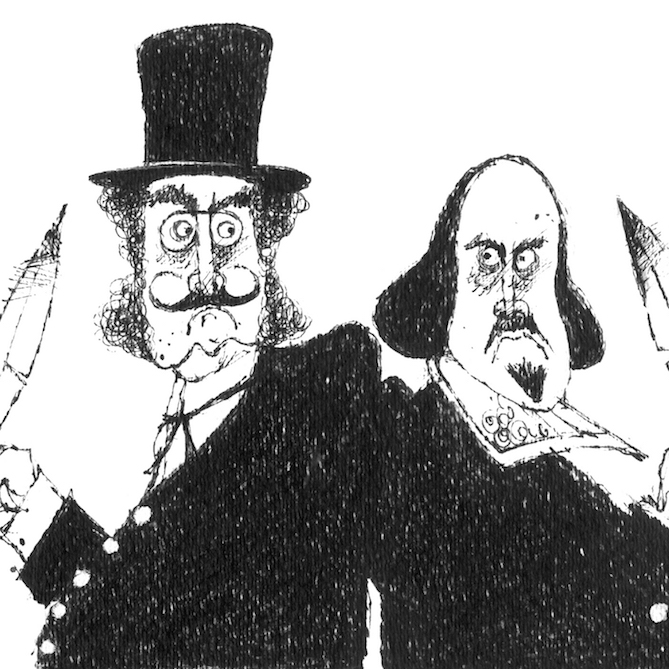
The View from Both Sides
Robert Battey
Critic. n.: one who walks out onto the field after a battle to shoot the wounded.
As a still-occasionally-performing cellist as well as a regular music critic for the Washington Post and STRINGS magazine, I feel exquisitely the sentiment expressed by the wag above. There are few things more discouraging than to give a concert of which one is proud, only to later read that you “had an off night, with wayward intonation and a pinched sound.” On the other side, to judge from the press quotes sprinkled in concert flyers and musicians’ bios, one might think that everyone is incredible. In such a subjective realm as the performing arts, these anomalies and injustices will always be with us. No two people hear the same thing at a concert; because each of us brings a different set of ears, references, and prejudices into the hall. So what, then, is the point of any of this?
Well, to be honest, I’m not sure. The system has so many inherent problems, that readers and concertgoers would be wise to discount a single good or bad review. In general, the way things should work is that after you’ve read enough of a given writer, you can form an opinion of whether his/her sensibilities seem to align with yours. This of course is easiest to do when you’re reading a review of a concert you attended; but regardless, a writer’s prejudices, bugaboos, verbal tics, and general attitude towards the job are discernable after four or five reviews. If you have come to trust a writer, you can then read with more enjoyment and partially rely on those opinions when you make future choices as a music consumer or presenter.
Despite the risks and flaws of this undertaking, I write because I believe that once in awhile I can offer useful insights about a performance, given my training and experience. I certainly have my detractors out there, to judge from letters and on-line comments, but that will be true of anyone who expresses a firm opinion. So let me now take you through the mind of one critic as he goes through the process of producing a review. I certainly speak for no one other than myself here. And this is just a “general interest” article, to the extent that it’s interesting at all; I have no advice as far as how to garner a good review other than “play your best.”
First, the nuts & bolts. Towards the end of each month, the editors decide which concerts will be covered the following month. The “stringers” are then sent a list of events and asked to submit our preferences and availability. As a still-active free-lancer in DC, I am precluded under the paper’s conflict rules from covering virtually any local group unless I can determine ahead of time that everyone’s a stranger to me.
There are still sometimes close calls. As I write this, I’m in California, traveling and performing with a little opera troupe that includes an excellent pianist who I just met. But two years ago, she took part in a mixed chamber music concert I reviewed, and I said uncomplimentary things about most of the performers. Thankfully, I singled this pianist out as an exception, averting what could have been a very awkward gig!
And of course I have friends in both the National and Baltimore symphonies, which I frequently cover. But with orchestras, I always focus on conductor, soloist, repertoire, etc., adding some broad comments about the band’s playing when pertinent. In any case, whenever I have a question about propriety, I discuss it with my editor. Sadly, despite my particular expertise in the area, there are many cello recitals I must recuse myself from, as well as many established chamber music groups; I’m friends with a lot of people in the industry, and have to just wish them well.
Once my assignments are set, the next question is whether I need to do any preparation. Usually the answer is no, but once in awhile I’ll be reviewing something I should know (like a popular second-tier opera that I never got around to playing, or perhaps a major 20th-century work that I somehow missed), and I will trouble myself to listen to at least part of it.
Most of my pieces in the Post are restricted to about six or seven column inches, basically three short paragraphs. When I’m finished with the obligatory who/what/where/when, there’s barely space for a sentence or two about the playing. If one of the works is a premiere, that always has to be discussed in particular, leaving me still less space to address the performance.
And premieres are the biggest challenge for me. First of all, I have no formal training in composition, and can’t offer any technical insight. Second, words and music are basically incompatible; if what the music “says” can be adequately described in words, it is poor music indeed. And trying to describe modern music in particular is almost impossible—has anyone ever read a written description of a contemporary piece, then heard the piece and thought, “Wow, that’s just how I thought it would sound”? Not me, certainly. But I know that, in many cases, my words about a new work might be the only ones that will appear in the mainstream media, and the burden really weighs on me. The best I can do (particularly with my space limitations) is to sketch a general impression of the piece, mention any influences I hear, and give it a kind of verbal letter grade. Inadequate, I know.
I’m most comfortable evaluating performances of standard repertoire—solo, chamber, or orchestral. I have a broad frame of reference, know a piece’s pitfalls and challenges from the inside, and will be the first to cheer a fresh creative approach. Of course I have my prejudices as well. At the level of concerts where the Post elects to send a critic, I expect absolute professionalism. I have a friend who has to read resumes and cover letters in her job, and she’s remarked that if she sees a single typo on either one, the application goes into the wastebasket. For my part, if I hear a wrong note or rhythm in a Beethoven or Ravel quartet that’s clearly not a slip of the finger, that carelessness will color every other impression I form about the group. If the conductor can’t be bothered holding down the brass so that the more important string parts may be heard, I can’t be bothered to look for positive things to say about him or her. If a violinist ignores the piano part when performing a sonata, doing the ornaments and phrasings differently, my patience will be at an end before we’ve even started.
But these kinds of lapses are rare at this level, and thankfully I’m usually able to comment on more substantive matters. We all react positively to true commitment and passion. I do like to get the impression that young players are aware of their heritage and have done some listening to iconic interpretations that came before. I have certainly seen the wheel re-invented on numerous occasions, and just smile to myself. But I try not to be an old fuddy-duddy; I am quick to praise young artists if their musical instincts are strong and natural, even if the ideas are less original than they realize. As for veteran musicians, the issue (for me) can sometimes be to what extent the depth and richness of interpretation compensates for eroding technical skills. I covered the last several appearances of the beloved Guarneri Quartet at the Kennedy Center, and it pained me to have to acknowledge the actual state of their playing compared to what it once was.
But again, there’s so much subjectivity in this racket that it’s a wonder people put as much stock in our words as they do. Your opinion about a performance is just as valid as mine, particularly if you know the piece. When people sometimes ask me “what are you listening for?” I’ll respond, Brando-like, with “what have you got?” Having been on the receiving end of both good and bad reviews, I can say that what I was focusing on and worrying about during a performance has never been what the reviewer commented on. What does that tell you?
My philosophy about the job is that I’m writing principally for musical history, posterity. Certainly, some get entertainment from reading a review of a concert they attended, just to see how much I missed and how clueless I am. And if I think a group was terrific and say so, I have no problem with its publicist quoting me in flyers, etc. With National Symphony subscription concerts (the only reviews I have to file that night to run the following morning), the review can affect people’s decision about whether to attend a subsequent performance. But for me, all these things are secondary to the main purpose. I want to fix a concert in place for all time; the good, the bad, and the beautiful. Decades or centuries from now, someone might be researching a biography of a certain artist, and the arc of his/her reviews is often a major component. Also, some of the penetrating critiques I’ve read by Shaw, Krehbiel, Downes, Thompson, Schonberg, and Porter have not only broadened my knowledge, they’ve affected my own interpretations. Even Heifetz once told an interviewer that a particular review made him stop, think, and reconsider some of his habits. Evgeny Kissin said much the same thing in a documentary video.
As a lowly stringer, I will never have the force and influence of the names I mentioned. Even if I had their writing talent, which I don’t, I don’t have the acres of column inches they had to work in. But my goal is the same; to leave behind something permanent and true (however brief) from the transitory, ephemeral experience of this miracle we call “music.”
Subjects: Artistic Vision
Tags: Battey, Beethoven, commitment, critic, expertise, Heifetz, patience, Philosophy, problems, robert, Strings Magazine, traveling

